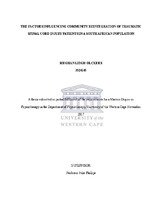The factors influencing community reintegration of traumatic spinal cord injury patients in a South African population
| dc.contributor.advisor | Phillips, Julie | |
| dc.contributor.author | Olckers, Meghan Leigh | |
| dc.date.accessioned | 2018-03-14T15:05:40Z | |
| dc.date.available | 2018-03-14T15:05:40Z | |
| dc.date.issued | 2017 | |
| dc.identifier.uri | http://hdl.handle.net/11394/5783 | |
| dc.description | Masters of Science - Msc (Physiotherapy) | en_US |
| dc.description.abstract | A spinal cord injury (SCI) is a devastating condition and is associated with permanent disability and decreased life expectancy (Rahimi-Movaghar et al., 2013). Traumatic Spinal Cord Injury (TSCI) as the name implies occurs as a result of a traumatic event such as a motor vehicle accident (MVA), fall or violence (WHO, 2013; Nwadinigwe, Iloabuchi, Nwabude, 2003). Spinal Cord Injury (SCI) can further be categorised into complete or incomplete loss of motor function and sensation of the cervical, thoracic, lumbar- sacral segments and other body regulation processes, the latter resulting in the loss of bladder and bowel control. | |
| dc.language.iso | en | en_US |
| dc.publisher | The University of the Western Cape | en_US |
| dc.title | The factors influencing community reintegration of traumatic spinal cord injury patients in a South African population | en_US |
| dc.rights.holder | The University of the Western Cape | en_US |

